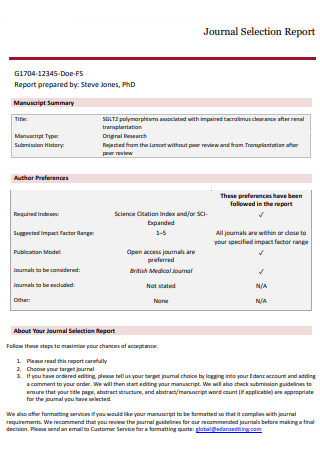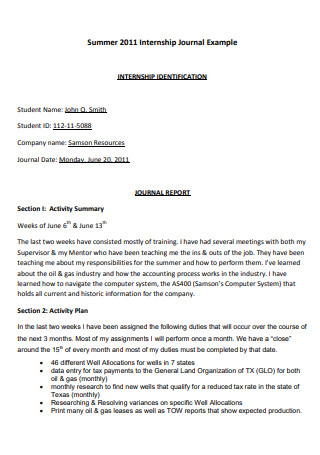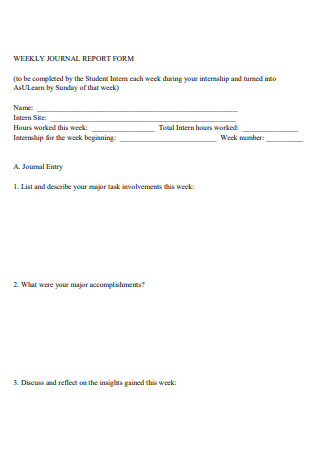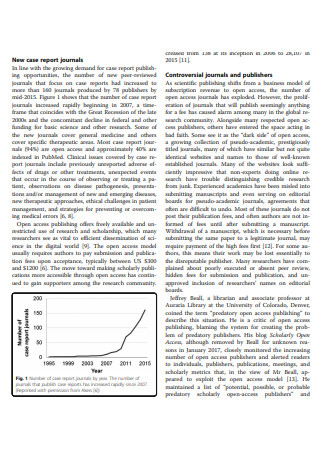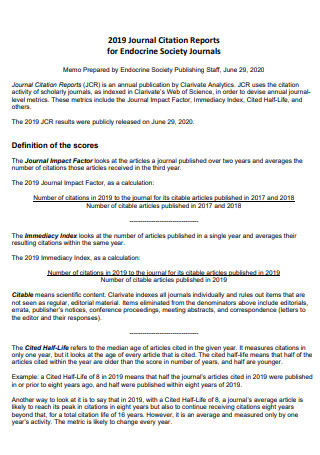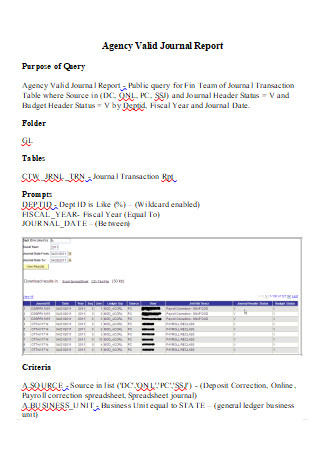5+ Sample Journal Report
FREE Journal Report s to Download
5+ Sample Journal Report
What is a Journal Report?
Different Types of a Journal Report
Benefits of Writing a Journal Report
Basic Elements of a Journal Report
How to Create a Journal Report
FAQs
What are some examples of journal reports?
What is the purpose of a research journal?
What are different types of journal manuscripts?
How to write a journal report?
What is the difference
What is a Journal Report?
A journal report is a worthwhile written document that contains an in-depth and systematic documentation of eclectic aspects in different fields such as financial transactions of a particular business firm or company. Commonly, this report can be applied in education, literary arts, scientific research, health and medicine, news and multimedia, and many other fields.
According to a study conducted, accuracy in communicating scientific discoveries must be accomplished, especially in writing journal reports. Sadly, the studies have shown that there exists poor quality in statistical reporting and data presentation. In 2011, 76-84% of papers with written measures that summarized data variability used standard errors of the mean, and 90-96% of papers did not report exact p-values for primary analyses.
Thus, all types of academic researchers, scientific researchers, medical professionals, reporters, and other writers must prove their credibility and accuracy in creating an effective journal report for the people in their fields, as well as possessing responsibility, clarity, and authenticity.
Different Types of a Journal Report
You need to learn and understand about the different types of journal reports because your way of writing is determined by the type of literary document you are working on. To assist you in constantly learning about writing and getting your reports and articles published, we will introduce and clarify to you about the different types of journal reports below:
1. Academic Journal Reports
These journal reports most commonly provide more information to various academic researchers especially in their respective projects. Typically, this type of reports are peer-reviewed by a specific institution, corporation, scholarly society or a professional or articles that critically review the research data and findings in order to publish and share latest news and reports of their research projects. Some common types of academic journal reports are scientific journals, review articles, supplemental articles, and many more.
2. Business Growth Journal Reports
Michelle Obama said: “Becoming isn’t about arriving somewhere or achieving a certain aim. I see it instead as forward motion, a means of evolving, a way to reach continuously toward a better self. The journey doesn’t end.” So, facilitate growth and transformation in business by enhancing the top line or revenue of the business with higher product sales or service income and other ways. We recommend that you record the noticeable improvements of your business by writing business growth journal reports. In this process, you can also measure the success of your enterprise as well.
3. Clinical Case Reports
If you are working in the field of health and medicine, particularly as a medical professional, it is important that you have the skills and expertise in writing clinical case reports. These reports are usually written in 500-1,500 words and written with the purpose of directly elevating global health outcomes and share vital clinical knowledge and medical case studies that contain useful information about a wide spectrum of areas of medicine, dentistry, pediatrics, neurology, cardiology, medical ethics, social work, veterinary science and many more.
4. Daily Journal Reports
Documenting day-to-day activities on your personal or work life can be accomplished with the use of daily journal reports. These reports consist of comprehensive accounts of different kinds of activities, tasks, events, and other things that are completed for every single day. Nataly Goldberg said: “Whether you’re keeping a journal or writing as a meditation, it’s the same thing. What’s important is that you’re having a relationship with your mind.” Other than recording daily activities, writing daily journals can be helpful in a person’s mental and emotional health. Scientific studies have shown that journal writing can help people with depression, eating disorder, bipolar disorder, ADHD and other psychological conditions to reduce the impact of various stressors on a person’s physical health and to better understand oneself, other people and the world we live in.
5. Editorial Reports
Formulating viewpoints about recent events and issues in the society according to an objective analysis of circumstances and conflicting opinions is one way of writing editorial reports. Typically, senior editors, and editorial writers are the ones who develop this kind of report as they present their own perspectives and opinions about various matters and complex issues.
Benefits of Writing a Journal Report
Wendy Laura Belcher, the author of Writing Your Journal Article in Twelve Weeks, stated in her book: “Most books on academic writing are also excessively concerned with style. Half their pages are devoted to improving word choice and syntax. She explained: “In my experience, this was the least of students’ problems. The writing research supported my own observation that what most students need is a better grasp of the macro aspects of writing—argument, structure, and summarizing.” So, what are the notable benefits of writing a journal report for research purposes? Below are some of the benefits of writing a journal report:
1. Record Data Points
By writing some notes while observing or reviewing a certain literature for research or data analysis, it will help you to record data points. Incorporate your emotional responses to research or interviews on your journal reports because they could still be compelling to note while working on your research, and they may potentially end up leveling up your understanding and/or interpretations of former research or findings.
2. Sort Ideas and Thoughts
Putting your ideas and thoughts on your journal during your research project in real time will let you observe and scrutinize what you were thinking in that particular moment as it may possibly become worthwhile information at the time of later review. Try writing your ideas and thoughts as you sort them out while preparing a draft of your research paper, or making a revision of your first draft. Plus, it can help you in threading connections between concepts and other themes you hadn’t noticed prior to envisioning them in written format.
3. Credibility and Clarity
It is very crucial that you verify the information sources and references through specific links and citations. You need to incorporate proper and factual backup on your journal. In this way, you are able to make your academic or research journals fully authoritative and credible. Do your best in verifying the facts based on their original sources. By doing this, the overall quality of your report and research project will make it more trustworthy and legitimate, being loaded with facts and truths. Then, writing journal reports is helpful to provide clarity about the main subject or topic.
4. Promote Active Reading
Working on journal reports can also promote active reading and influence deep thinking. After gathering some necessary facts from a single source, you need to research other sources and references in order to verify the data you collected, especially if they are true or not. With this, it pushes you to read more and more valuable sources that will help your mind obtain more knowledge and understanding about the matter.
5. Expand Perspective
After conducting different types of research projects and analyses, writing journal reports can help you expand your perspective on a specific idea or topic. Constantly reading a wide array of ideas, thoughts, and opinions from many people is a fantastic way to formulate opinion and conclusions accordingly about a wide array of topics which can be unknown to you. So, it is a great way of expanding your knowledge and filling your brain with different perspectives about several topics from many varying angles.
Basic Elements of a Journal Report
In this section, you will learn how to construct a remarkably written and comprehensive journal report. However, a journal report has different features. Include the following elements for you to create an impressive document:
How to Create a Journal Report
Creating a journal report is an effective way to keep track and manage your research work and other projects. Aside from working on your academic, scientific, or other research projects, a journal report can effectively outline collected and analyzed information along with the research methods, results, and conclusion in the right order conveniently.
Below are some easy-to-follow tips that indicate how to design and create a professional journal report:
Step 1: Research the Main Subject
Lisa See said: “Read a thousand books, and your words will flow like a river.” This statement is true as reading different kinds of books, references, research papers, and many others can help you open many doors of vital information for your work. So, accommodate some adequate time on conducting a research of the topic or subject of your journal report work. For example, search for keywords using the internet. In this process, you will know where to start your journal report and concentrate your attention on your primary goals and objectives.
Step 2: Identify Specific Targets and Objectives
How do I narrow down my research subject? Gain awareness about what is going on connected to your journal reports, and other research papers and literary reviews through writing a list of research questions and trim the list to one or two questions. By doing this, you are keeping your eyes open and straight towards your aim. When you identify your specific targets and objectives, this will help you work effectively on your journal report.
Step 3: Collect Information and Review Other References
Delve into the main topic of your report while collecting sufficient information about it. Also, review other references carefully, making sure that your materials and other literary sources are accurate and credible. Read a decent amount of previous academic or scientific journal reports, research articles, and other information that correspond to your report based on various references and other sources.
Step 4: Proofread or Revise the Report
Proofread your journal report while checking if there are any typographical or grammar errors. Consult with your team members and other professional writers and editors that you are close with concerning the quality and content of your journal report. Then, revise your report immediately if needed so that you can submit your journal report properly.
Step 5: Prepare the Final Report
After the proofreading and revision process, you can now prepare the final report. Include the conclusion and citations on the last part of your document. Skim your report for final evaluation and quality check.
FAQs
Some examples of journal reports are academic research journals, business trade journals, newspapers, popular magazines, news and editorial magazines, and more.
What are some examples of journal reports?
The purpose of a research journal is to convey the outcomes of a specific research in the field of study. It presents a systematic and in-depth study of a particular topic which is often involved in various surveys and experiments.
What is the purpose of a research journal?
The different types of journal manuscripts are case studies, rapid communications, review articles, and original research. Case studies report certain situations of interesting and meaningful phenomena, often used in medicine to report the occurrence of previously undiscovered or developing pathologies. Rapid communications contain interesting findings that may be beneficial for many researchers and scientists. Review articles are written to give a well-detailed summary of a particular research. While original research is the most basic type, being used in many different kinds of fields and studies.
What are different types of journal manuscripts?
If you need to write a journal report, you must be clear while interpreting the essential points and discard the irrelevant details. Present the information in a logical order. You don’t need to make your words and phrases too complicated.
How to write a journal report?
Journals are usually written for scientific researchers and other specialists. On the other hand, articles are written documents that provide original research, data-based conclusions, abstract, and endnotes.
What is the difference between articles and journals?
Therefore, writing a clear and systematic journal report can make one feel like entering into a strange labyrinth especially if the topic is very strange or challenging to write. But don’t be anxious because with this article, it will be your guide containing beneficial tips and steps that you can use so that you are able to craft an extremely well-written journal report. Plus, your strong willpower and perseverance will help you to keep going on the path which you have selected despite the obstacles you will encounter. So, we recommend that you download our free journal reports samples here right now and try your best to reach flying colors!

